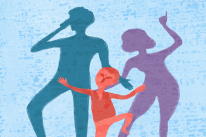
I wrote this letter to my extended family years after I chose to become estranged from my parents because many of them cut me out of their lives instead of reaching out to hear my side of the story.
It pains me that I have lost contact with some of them because they refuse to see the full picture, and at times I feel as though I have lost a part of myself. Yet, at the same time, I am free.
The letter you are about to read comes from a place of acceptance and longing. I have chosen to share this letter publicly because I suspect I’m not alone in what I have been through, and I hope my experience can be helpful to others in some small way.
—
I never meant for you to get hurt or caught in the crossfire. I never meant to place you in a situation where you found yourself questioning your loyalties and what you thought was true.
From the outside you saw a happy home. You saw a child receiving educational opportunities and the latest technology, fashion, and trips around the world, and having birthday parties with friends and family.
You saw pictures of vacations and holidays where everyone was smiling and appeared to be happy. You read the Christmas cards and email updates describing family vacations, accomplishments, and happy memories.
You read about my sister getting sick, and you believed the beautiful story of a family coming together to overcome this adversity.
At a family gathering you watched as my parents presented me with a gift before I went away to university. They acted so proud, and you found yourself thinking “What kind and loving parents.”
Then, without warning, you found out that I was not speaking to my parents and they were not even invited to my upcoming wedding.
Maybe you thought about reaching out to me to hear my side of the story, but you didn’t. Instead, you contacted them and you believed their story.
You began to think that I was nothing more than a rude, entitled, spoiled brat who had decided that she didn’t need her family anymore and didn’t want to help her sister with her ongoing health problems because she was marrying into a “better family.”
If you did contact me, you tried to convince me to change my mind. You didn’t listen to me and you became frustrated. You declined my wedding invitation and sent me a pity gift out of duty, or you chose not to respond at all.
The years passed, and when another family member mentioned my name, you either said nothing or asked if I had “grown up and started speaking to my parents again.” Or, you questioned why they would want to continue to have a relationship with me.
What you don’t realize is that I tried. Behind the family gatherings you attended, the pictures you saw, and the stories you heard, a very different picture was being painted. I kept quiet about this picture, and I even helped to paint it out of fear and shame.
At times, I desperately wanted to believe that this picture was true. I tried to convince myself that it was, but I have learned that you can only endure pain and abuse for so long before you either give into it, surrendering yourself in the process, or fight to break free.
After I left for university, I began to change how I saw the picture and I began to accept it for what it was, not what I so desperately wanted it to be.
I reached out to my parents many times, I invited them to come and visit me, and I suggested activities that we would all enjoy together. I came home for holidays and tried to connect with them. I bought them gifts and tried to fill my old role within the family.
Each time I reached out I was rejected; they made excuses as to why they couldn’t come and why they didn’t have more time to spend with me over holidays, and they continued to find ways to tear me down. The pain of this rejection ate away and my sense of self-worth, and I started to question why anyone would love or take a genuine interest in me.
I invited them to award ceremonies and concerts, and while they appeared to express pride over these accomplishments, the story they told me was the same as it had always been:
“You will never amount to anything. You are going to come to a sad end. They only gave you that award out of pity. You only accomplished that by luck. If you had worked harder you could have gotten first place. You are never going to have a successful career—that’s just a pipe dream.”
I never told you about these comments or how they tore apart my self-esteem, causing me to question everything I did and everything I knew to be true, because they told me that you would never believe me, and I didn’t want to cause more conflict.
Out of a sense of compassion I let my parents keep their picture, all the while hoping that you would see mine and reach out to me and be part of my life again.
I hope you understand that no one comes to a decision like this lightly. For most estranged children, this is one of the hardest choices we ever had to make. A choice that we have agonized over with our friends, other therapists, and in the silence of our own minds.
Often it takes years of hurt and pain to accept that we will never have the adult relationship that we want with our parents.
We are taught that relationships with family are the most important relationships we will ever have, and we are socialized to believe that we should continue to have these relationships no matter how they impact us physically and psychologically.
Society has painted a picture of the estranged child as being the problem, the emotionally unstable one, the one who asked their parents for money so many times they bankrupted the family and had to be cut off.
Rarely do you hear the voices of the other side, the voices of the children so desperate for love, validation, and approval that they feel empty and continue to try harder and harder until they break. The children that long for their parents to take a genuine interest in their lives, without judgment, and walk alongside them in support during every phase of life.
But for some of us this picture will never be, and we can either be consumed by that longing or accept the picture that is. I know that this may seem harsh, but sometimes acceptance holds the key to a better life.
Once I accepted the picture that is, I was free. I still saw parents helping their children buy supplies for university, but I no longer wished my parents would come and help me.
I still watched the proud parents with the graduates at convocation and longed to be one of them, and I still found myself imagining what supportive parents might have said at my convocation and my wedding, and yes it still hurts. It might always hurt.
At the same time, I am free from the hope that maybe this time they will come, maybe this time they will be proud of me, and maybe this time I will be enough. I can grieve the loss of what I had hoped for, accept what is, and move forward with my life.
If we ever talk again, you might ask me, “Would you ever talk to your parents now, now that you have grown up and are living the life you want?”
As I start to answer that question I find myself again imagining the relationship I had longed for and still long for, but I stop myself. Instead I will ask you a different question: “Can you please forgive me for the choice I had to make and be a part of my life again?”
Grandma wisely said, “Every choice we make will hurt or impact someone, but sometimes you need to do what is right for you.”
When I chose to stop speaking to my parents, I had to not only grieve the loss of them but you as well.
I don’t feel I can call you and reminisce about that time you taught me how to parallel-park, my failed attempt at making grandma’s Christmas pudding, or the camper I saw that reminded me of the one that grandpa had that we used to play in.
I have no one who has lived through those memories with me to reminisce with, and this only fills me with a greater sense of loss.
If we ever talk again you might ask me: “Do you hate your parents?” The answer is no, I don’t hate them. The truth is I don’t feel anything for them anymore. In my heart I have forgiven them for the pain they caused me, but I don’t want to open the lines of communication to tell them that, not yet, maybe not ever.
As I think back on the relationship, and those years of pain, I acknowledge this experience has made me who I am today.
I strive to live a full life. I fill my days with activities and work that bring meaning to my life and the lives of others. I trust my instincts and I am aware of how people and situations affect my well-being, and I work to reduce the negative impact of these factors whenever possible.
I’m opening up about this experience because I hope you will start to paint a new picture that allows me to be a part of your life again. But if you don’t, then let me use this experience to help others.
I have learned that some people can only give us so much, and I am grateful for the only gift my parents could ever give me—my life, a life I will live to the fullest, and one I want you to be a part of it.
—
To anyone struggling with the choice to become estranged from their parents, let me ask you these questions:
Have you tried many times and been rejected? Do you feel that nothing you can ever do or be will be enough? And finally, do you hear their voices inside your head and then question your ability, your instincts, and your self-worth?
If so, you may need to let go. If you do decide that this is the right choice for you, you will grow in ways you never imagined, and with that growth will come a sense of peace and self-love. You will learn to trust yourself and to care for yourself physically, psychologically, and spiritually which will lead to improved happiness and health.
Researchers have found that abused children do not stop loving their parents; they stop loving themselves. After I stopped speaking to my parents, I became more confident, I began taking risks, and I learned for the very first time to love myself and accept the journey I am on.
I earned two bachelor’s degrees, a master’s, and I started my PhD. I taught at prestigious arts schools and wrote and had articles published. My point is not to brag, only to point out that had I not let go of the relationship with my parents, I never would have accomplished any of these things.
Their stories of what they thought I was incapable of and what I couldn’t be would have held me back, because I would have believed them. My relationship with my parents would have been like a dark seal that I would never have broken through.
If this is true for you as well, know that you likely will not be alone if you decide to cut ties with your parents; odds are, there will be people in your life that will support you and even take on part of the role a loving parent would have taken. These people might be friends, friends’ parents, neighbors, colleagues, or even extended family. Any number of people might step up once they understand your story.
They will be grateful for what you bring to their lives and will love and support you unconditionally. It will not be the same, but you will cherish these relationships because they are positive.
A part of you may always long for a supportive relationship with your parents, but don’t fight this feeling; acknowledge it as a part of your journey.
You might even find yourself questioning this choice years later and wonder if time could have healed this relationship. Remember why you made this choice, remember the pain, and trust that you made the right decision.
Also, realize that you didn’t make this decision alone, although it may feel like it. Your parents helped to make this choice with you through their attitudes, their actions, and their refusal to be a part of your life in the way you needed them to. Knowing this may help to ease your feelings of guilt.
And know this: If you are estranged from your parents, you are strong because you have taken back the paintbrush and are now free to repaint your picture with those who love and support you.
—
UPDATE: In response to some of the reader comments questioning her decision, Jen has posted a video follow-up to her article on YouTube here.
About Jen Hinkkala
Jen Hinkkala is PhD student, researcher, and teacher of arts education in Canada. She strives to understand what factors and experiences lead to higher levels of wellness, resiliency, and self-care among arts educators and students. Jen is also a life coach and specializes in self-care, well-being, time management, performance anxiety, estrangement, overcoming abuse, career paths, and anxiety. Jen runs a support group for estranged adults and a group to support personal development. Follow her here: Twitter / Blog.













 Though I run this site, it is not mine. It's ours. It's not about me. It's about us. Your stories and your wisdom are just as meaningful as mine.
Though I run this site, it is not mine. It's ours. It's not about me. It's about us. Your stories and your wisdom are just as meaningful as mine.